 Your new post is loading...
 Your new post is loading...
"The great thing about the modern world -- and the Internet is both an instrument and a metaphor for it -- is that everybody’s connected and everything is connected. It’s like I said if you look at this precipitous drop in life expectancy among white high-school dropouts, there are clear medical reasons for it but there are also psychological and social reasons that have reinforced it. And if you look at what’s working where the places that are growing economically in America, places that are doing best around the world, you have these creative networks of cooperation." Bill Clinton, referring to the ideas in Steven Johnson's "Future Perfect."
"Network politics are also often concerned with the issues raised by commons. The internet—means and motive for much activism—is a clear example of such a digital resource: anyone can access it under the same conditions and all traffic can, at least theoretically, be treated equally (a state which is known as “network neutrality”, and a great rallying cry). But here the externalities not captured by the market are more positive than negative. Often, the more people share and use such a commons, the more they all benefit."
Scientists say that whether tipping waiters or trading Christmas cards, we're programmed to reciprocate when we receive a gift. But the rule of reciprocity can also complicate politics and medicine.
Dog owners, dog parks, dog poop, are a testing ground for tragedy of the commons and public goods dilemmas in many communities. Empirical studies like this one shed some light on design of successful commons. -- Howard "A recent study conducted by Daniel Matisoff and Douglas Noonan of the Georgia Institute of Technology was set up to “test the relationship between the perception of the park as a successfully governed common resource pool (CRP), and behaviour which contributes to collective action, such as contributing time, money, or to the upkeep of the park and developing a sense of community.” In other words, they wanted to know if people were more likely to get involved in the maintenance and community of a dog park if it appeared to them to be a well-maintained dog park with a strong community."
"Darwin’s publication of On the Origin of Species sparked major battles. The most famous may have been between science and religion, but there were disputes within science as well. One of the most heated was whether natural selection favored cooperative or competitive behaviors, a battle that still rages today. For almost 100 years, no single person did more to promote the study of the evolution of cooperation than Peter Kropotkin.
Kropotkin traveled the world talking about the evolution of cooperation, which he called “mutual aid,” in both animals and humans."
Christakis has done important work on "contagion" in social networks and in this talk (transcript or video) touches on the interdisciplinary study of cooperation that I've been talking about for ten years. -- Howard "Incidentally, related to that, it's not just that a biological hurricane is approaching the social sciences. Social sciences are generating questions that biologists are becoming interested in. One of my favorite examples of this is cooperation. This is a topic that social scientists have been interested in for a very long time, and evolutionary biologists as well. But now this is drilling down even to the cellular or molecular level, and people are beginning to ask questions about how sub-organismic biological entities “cooperate,” and what does it mean for biology?"
What social dilemmas theories have failed to take into account thus far is the way individuals internalize the sense of the group. This finding could be important. -- Howard "Whether or not to change strategy depends not only on the personal success of each individual, but also on the success of others. Using this as motivation, we study the evolution of cooperation in games that describe social dilemmas, where the propensity to adopt a different strategy depends both on individual fitness as well as on the strategies of neighbors. Regardless of whether the evolutionary process is governed by pairwise or group interactions, we show that plugging into the "wisdom of groups" strongly promotes cooperative behavior. The more the wider knowledge is taken into account the more the evolution of defectors is impaired. We explain this by revealing a dynamically decelerated invasion process, by means of which interfaces separating different domains remain smooth and defectors therefore become unable to efficiently invade cooperators. This in turn invigorates spatial reciprocity and establishes decentralized decision making as very beneficial for resolving social dilemmas."
Conflict is the obverse of cooperation. Human sociality in general and specifically our complex institutions for collective action are multi-leveled, with neural, cognitive, interpersonal, and emergent network components. Only a multi-levelled approach to understanding it will be able to illuminate this phenomena -- simplistic explanations don't do it justice. The imaging techniques Saxe uses promise to be an important probe. -- Howard "Our society is built of a bunch of minds trying to work together. It seems like having better, more scientific understanding of the mind is the only possible way to have a better functioning society. That's the big idea, which seems quite ludicrous. Then the question is to try to work it out in an example. The example is almost as ludicrous. The example I'm working on right now is conflict and conflict resolution: how to make groups of people that are suspicious of one another and on the brink of war with one another more tolerant, more accepting, more forgiving, and more capable of working together. There are a bunch of ways that the kind of neuroscience I've done could help in that context. The science that I do is on how our brains let us think about other minds. There's at least three ways that that kind of science could help us think about conflict. One is the idea that conflict is actually conflict about other people's minds. What conflict is, in part, is the suspicion of other people's motives, the inability to trust and forgive, and the way that our expectations of group boundaries make us less empathetic and more damning of other people's actions."
Every student of cooperation theory must read Ostrom. I was fortunate to have made the pilgrimage to Bloomington to meet her and Vincent Ostrom and to talk with her and her colleagues at their Workshop -- Howard "IT SEEMED to Elinor Ostrom that the world contained a large body of common sense. People, left to themselves, would sort out rational ways of surviving and getting along. All these cases had taught her that, over time, human beings tended to draw up sensible rules for the use of common-pool resources. Neighbours set boundaries and assigned shares, with each individual taking it in turn to use water, or to graze cows on a certain meadow. Common tasks, such as clearing canals or cutting timber, were done together at a certain time. Monitors watched out for rule-breakers, fining or eventually excluding them. The schemes were mutual and reciprocal, and many had worked well for centuries."
Human sociality is a complex adaptive system so I am skeptical that anybody will ever discover a formula; however, game theory combined with evolutionary theory is a powerful probe into cooperation -- how it originated and evolved and how it is maintained and blocked. -- Howard "A new paper, Iterated Prisoner’s Dilemma contains strategies that dominate any evolutionary opponent (pdf), has just been published in the Proceedings of the National Academy of Sciences. Written by William Press and Freeman Dyson, it represents a substantial breakthrough in strategies that work in the Prisoner’s Dilemma game. The key point? There does exist a strategy where a player can “enforce a unilateral claim to an unfair share of rewards.” The implications of this paper are fascinating. For biological evolution, it opens up new thinking about reproductive strategies and life history theory, as well as the direct impact on ideas about the evolution of cooperation. For cultural evolution, it seems to provide some powerful insights into the evolution of inequality in human society. As the agriculture revolution and population growth led to the ability to monopolize social resources and create differential wealth, what happened with social class? Did human cooperation turn from fairness to enforcing the sort of unfair game that Press and Dyson outline?"
The evolutionary roots of human cooperative behavior remain contested, but gradually empirical and theoretical evidence are building a case for how we became super-cooperators -- Howard "Are human beings intrinsically good but corruptible by the forces of evil, or the reverse, innately sinful yet redeemable by the forces of good? Are we built to pledge our lives to a group, even to the risk of death, or the opposite, built to place ourselves and our families above all else? Scientific evidence, a good part of it accumulated during the past 20 years, suggests that we are all of these things simultaneously. Each of us is inherently complicated. We are all genetic chimeras, at once saints and sinners — not because humanity has failed to reach some foreordained religious or ideological ideal — but because of the way our species originated across millions of years of biological evolution."
Nowak addresses the interesting question of how cooperation might have evolved and persisted in an evolutionary process apparently dominated by competition -- Howard "Cooperation is needed for evolution to construct new levels of organization. The emergence of genomes, cells, multi-cellular organisms, social insects and human society are all based on cooperation. Cooperation means that selfish replicators forgo some of their reproductive potential to help one another. But natural selection implies competition and therefore opposes cooperation unless a specific mechanism is at work. Here I discuss five mechanisms for the evolution of cooperation: kin selection, direct reciprocity, indirect reciprocity, network reciprocity and group selection. For each mechanism, a simple rule is derived which specifies whether natural selection can lead to cooperation."
Introduction to Cooperation Theory a six week course using asynchronous forums, blogs, wikis, mindmaps, social bookmarks, synchronous audio, video, chat, and Twitter to introduce the fundamentals of an interdisciplinary study of cooperation: social dilemmas, institutions for collective action, the commons, evolution of cooperation, technologies of cooperation, and cooperative arrangements in biology from cells to ecosystems.
|
Are people, by nature, kind or rotten? This question has kept philosophers, theologians, social scientists and writers busy for millenniums.
"Does fairness come standard with every newborn, or is it something that we (hopefully) develop as we mature? Here’s a multimedia attempt to answer that question."

|
Suggested by
Ken Morrison
|
"Both groups demonstrated the same level of cooperation. Whether the students met face to face or online didn’t change their decisions about how many tokens to give away or keep. But students who met in person were far better at predicting the trustworthiness of the partner; that suggested they were relying on visual cues. “Lack of face-to-face contact didn’t make people more selfish,” said the study’s lead author, David DeSteno, a professor of psychology at Northeastern. “But a person’s ability to predict what their partner was going to do was greater face to face than online. There is something the mind is picking up that gives you greater accuracy and makes you better able to identify people who are going to be trustworthy.”
William Benzon wrote extensively about this hypothesis years ago in his book (recommended) "Beethoven's Anvil" -- Howard "Anyone who has ever played in an orchestra will be familiar with the phenomenon: the impulse for one's own actions does not seem to come from one's own mind alone, but rather seems to be controlled by the coordinated activity of the group. And indeed, interbrain networks do emerge when making music together -- this has now been demonstrated by scientists from the Max Planck Institute for Human Development in Berlin. The scientists used electrodes to trace the brain waves of guitarists playing in duets. They also observed substantial differences in the musicians' brain activity, depending upon whether musicians were leading or following their companion."
Altruistic punishment and the spread of information about non-cooperators through gossip appears to be important components of human cooperation (and Robin Dunbar has made the case that gossip may be at the root of human spoken communication). -- Howard "What makes these violations of moral rules so instructive is how societies choose to deal with them. Ultimately, it all comes down to gossip. More than tool-making, art, or even language, gossip is a human universal that is a defining feature of our species (though this could change if we ever learn to translate the complex communication system in whales or dolphins). Gossip is intimately connected with the moral rules of a given society, and individuals gain or lose prestige in their group depending on how well they follow these rules. This formation of group opinion is something to be feared, particularly in small rural communities where ostracism or expulsion could mean death. "Public opinion, facilitated by gossiping, always guides the band's decision process," Boehm writes, "and fear of gossip all by itself serves as a preemptive social deterrent because most people are so sensitive about their reputations." A good reputation enhances the prestige of those individuals who engage in altruistic behavior, while marginalizing those with a bad reputation. Since prestige is intimately involved with how desirable a person is to the opposite sex, gossip serves as a positive selection pressure for enhancing traits associated with altruism. That is, being good can get you laid, and this will perpetuate your altruistic genes (or, at least, those genes that allow you to resist cheating other members of your group)."
Henrich's work on the evolution of culture and culture as an evolutionary force is fundamental to interdisciplinary theory of cooperation. -- Howard "We've begun to pursue this idea called the cultural brain hypothesis—the idea that the real driver in the expansion of human brains was this growing cumulative body of cultural information."
Rethinking Prisoner's Dilemma strategies is a big deal because of the huge body of work, but you can't get more prestigious than Freeman Dyson. --Howard "The world of game theory is currently on fire. In May, Freeman Dyson at Princeton University and William Press at the University of Texas announced that they had discovered a previously unknown strategy for the game of prisoner's dilemma which guarantees one player a better outcome than the other. That's a monumental surprise. Theorists have studied Prisoner's Dilemma for decades, using it as a model for the emergence of co-operation in nature. This work has had a profound impact on disciplines such as economics, evolutionary biology and, of course, game theory itself. The new result will have impact in all these areas and more.?
Bauwens has been thinking about the big picture around p2p everything for a long time. He's been developing a non-Marxist alternative to capitalism for a while. His philosophy has distilled over the years. -- Howard "Commons-based peer production, by contrast, is emerging as a proto-mode of production in which the value is created by productive publics or ‘produsers’ in shared innovation commons, whether they are of knowledge, code or design. It occurs wherever people can link up horizontally and without permission to create common value together. It has the most potential as a leverage to transform what is now a proto-mode of production into a real mode of production beneficial to workers and ‘commoners’. To achieve this, strategic and tactical breaks with capitalism are necessary, though not necessarily with market forms."
Cooperation is a complex confluence of social, cultural, and (now, apparently) neural factors. -- Howard "The participants in the study also displayed marked differences in brain activity while they were deciding how to split up the money. In the case of selfish people, the small brain region behind the ear is already active when the cost of altruistic behavior is very low. In altruistic people, however, this brain region only becomes more active when the cost is very high. The brain region is thus activated especially strongly when people reach the limits of their willingness to behave altruistically. The reason, the researchers suspect, is that this is when there is the greatest need to overcome man's natural self-centeredness by activating this brain region. Ernst Fehr adds: "These are exciting results for us. However, one should not jump to the conclusion that altruistic behavior is determined by biological factors alone." The volume of gray matter is also influenced by social processes. According to Fehr, the findings therefore raise the fascinating question as to whether it is possible to promote the development of brain regions that are important for altruistic behavior through appropriate training or social norms."
KF: An interesting book available under a reasonably new “copyfarleft” licensing arrangement. The book provides some useful insights into openness and peer/collaborative production strategies. It brings to mind the Cachalot book from Duke University where expertise is crowd-sourced, peer review is managed and distribution is open-source. These new models of content creation and distribution are set to challenge the established (dis)order of publishing and distribution.
Via jean lievens, P2P Foundation
"Architectures of participation" (Tim O'Reilly) enable self-interested acts to aggregate into public goods -- Howard "In many ways, I actually think the real idea of open source is for it to allow everybody to be "selfish", not about trying to get everybody to contribute to some common good. The Linux-based Android smartphone system has spread the use of Mr Torvalds' invention
In other words, I do not see open source as some big goody-goody "let's all sing kumbaya around the campfire and make the world a better place". No, open source only really works if everybody is contributing for their own selfish reasons."
In peer production communities such as Wikipedia, a little reward goes a long way -- Howard "We test the effects of informal rewards in online peer production. Using a randomized, experimental design, we assigned editing awards or “barnstars” to a subset of the 1% most productive Wikipedia contributors. Comparison with the control group shows that receiving a barnstar increases productivity by 60% and makes contributors six times more likely to receive additional barnstars from other community members, revealing that informal rewards significantly impact individual effort."
|
 Your new post is loading...
Your new post is loading...
 Your new post is loading...
Your new post is loading...








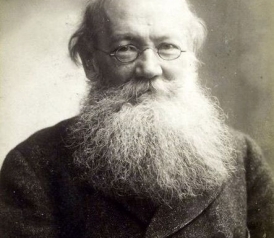
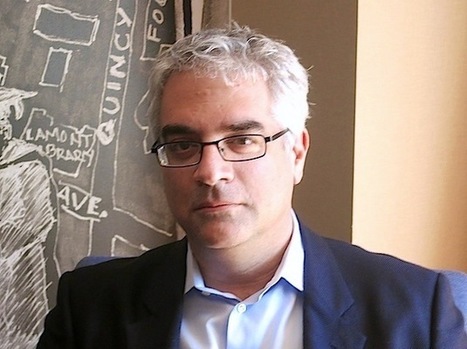






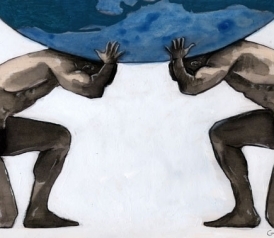
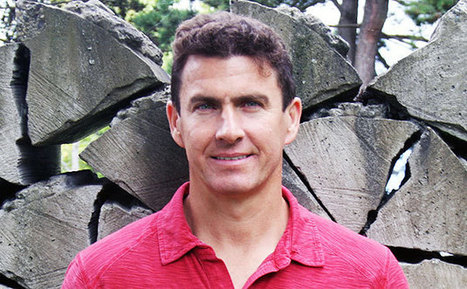

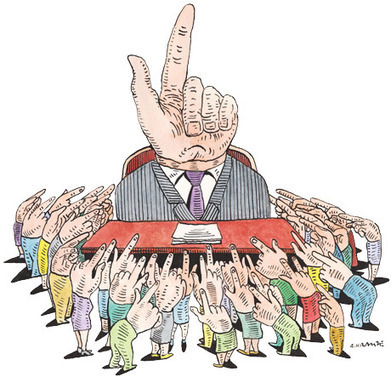

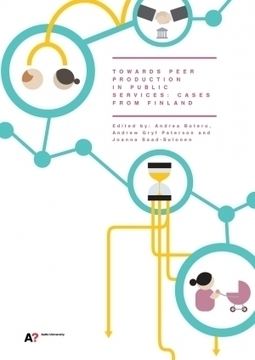






Steven Johnson's "Future Perfect" is recommended for those who are interested in the role of networks of cooperation in the political sphere. On his blog, Johnson quotes former President Bill Clinton quoting and referring to "Future Perfect." I dialogue between Steven Johnson and Bill Clinton! What more could a person interested in cooperation theory ask?